|
||||||||
|
|
|
2016-10-09 ArtNo.45886
◆Review:The baptism of the Holy Spirit (Conversion and Resurrection)
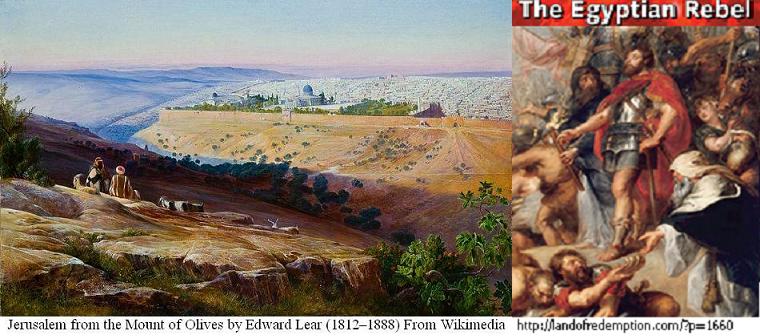 Around AD 56, when Paul completed his third missionary journey and returned to Jerusalem together with a delegation of Hellenist believers from churches around the Mediterranean region, the Sicarians, who were the most notorious of the Zealots, led by an Egyptian leader named Joshua, which means Jesus in Greek, first went into the wilderness and then to the Mount of Olives. From there they planned to capture Jerusalem in a decisive battle. However the rabble was wiped out by Felix, the Roman governor, according to "The Original Jesus." Simon, the younger brother of Jesus, is said to have been a member of the Zealots. ○On the eve of the Jewish war 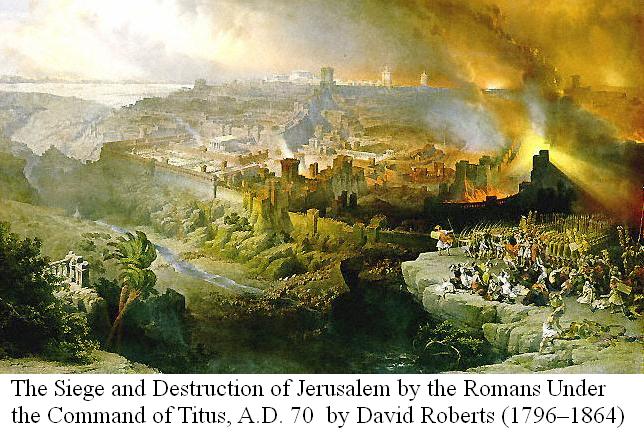 It seems to have become the background of the frequent rebellions that the hope, that the Savior would come around AD 33-34 when Daniel's 'Seventy Weeks prophecy' in the Old Testament was fulfilled and Israel would be re-emerging, was growing. The followers of the Jerusalem church also appear to have believed that the second Christ coming would be realized around that time. Paul preached that Jesus' second coming would realize while he was alive and at that time, the martyrs, the dead in Christ, would rise first and then believers who were still alive, including Paul himself, would be caught up together with them in the clouds to meet the Lord in the air, in 'The First Epistle to the Thessalonians.' However both the temple and the city of Jerusalem were destroyed by the Roman army during the first and the second Jewish war which occurred in AD 66 and 70 respectively. Although the followers of the Jerusalem Church led by Simon, who had sat on the throne of the church after the martyrdom of James the Less in AD 62, fled the city just before being surrounded by the Roman army in AD 66, the church was gradually forgotten because it had lost the headquarters which had been founded adjacent to the house of the high priest Caiaphas. Thus, Paul visited James the Less just at that time when the fate of the gear began to rotate toward the Jewish war, which would end an era of Israel. All the elders were present and they asked Paul to serve as a witness of "The Nazarite Vow" and to pay the cost of the ceremony on behalf of the petitioners and to prove the innocence of himself. Paul accepted their proposal. ○Paul was rescued by a Roman commander  When the seven days were nearly over, some Jews from the province of Asia stirred up the whole crowd and seized Paul, shouting, "This is the man who teaches all men everywhere against our law and then to top it off, brought Greeks into the temple area and defiled this holy place." When they dragged him from the temple, and immediately the gates were shut. While they were trying to kill him, Claudius Lysias, a commander of the Roman troops took soldiers and ran down to the crowd and rescued Paul. (Acts 21:27-32) The author of the Acts seems to imply that the security guards of the temple and the attackers made advance arrangements of the raid by saying, "immediately the gates were shut." However, a commander of the Roman troops took soldiers and ran down and rescued Paul. It appears that the side of Paul also knew such arrangements had been made and prepared for it. The commander, who had asked Paul, "Aren't you the Egyptian who started a revolt and led four thousand terrorists out into the desert some time ago? (Acts 21:38)" not only provided him the opportunities to talk regarding his faith to the crowd and the Sanhedrin members but also ordered to get ready a detachment of two hundred soldiers, seventy horsemen and two hundred spearmen and sent Paul to Governor Felix in Caesarea after perceiving a plot to kill Paul made by the Jews. (Acts 23:33) ○Paul was kept under guard in Herod Agrippa II's palace 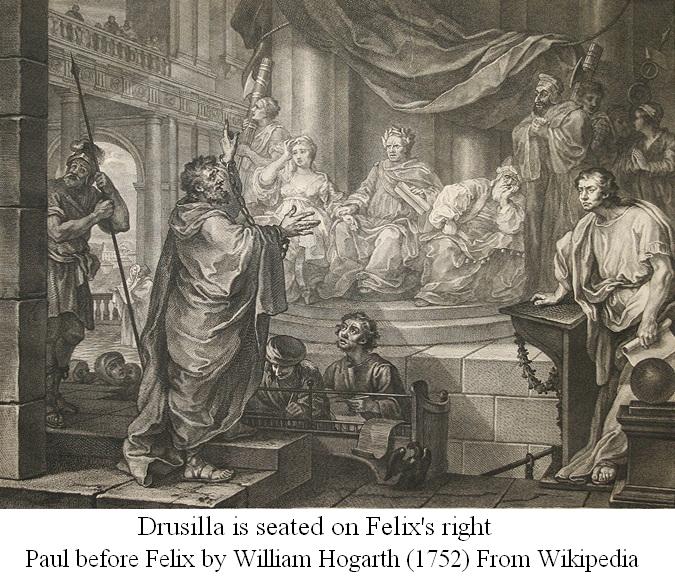 Then Felix ordered that Paul be kept under guard in Herod Agrippa II's palace. By the way, Agrippa II had three sisters, namely, Berenice, Mariamne and Drusilla. And Drusilla was a second wife of Felix. Drusilla was engaged to Epiphanes, a prince of Commagene, when she was less than 6 years old. But the engagement became broken off, because the prince refused to convert to Judaism. Then her brother Herod Agrippa II gave her in marriage to Azizus, Priest King of Emesa, who, in order to obtain her hand, consented to be circumcised when she was 14 years old. However, around AD 54 she divorced Azizus and remarried Felix who had been struck by the great beauty of Drusilla. She was about 16 years old. Thus, Antonius Felix, who was originally a freedman of the empress Antonia (Mother of Emperor Claudius), seems possibly to have converted to Judaism and to have been circumcised, too. The author of the Acts also commented, "Felix was well acquainted with the Way." (Acts 24:22) After all, Paul was detained for two years in Caesarea, but was allowed to interact with his friends and others. Felix often sent for Paul and listened to him together with his wife Drusilla as Paul spoke about faith in Christ Jesus. However, the author of the Acts comments that Felix kept Paul under guard for two years, because he wanted to grant a favor to the Jews and at the same time he was hoping that Paul would offer him a bribe, so he sent for him frequently and talked with him. (Acts 24:26-27) Paul seems to have had the potential to give him a bribe. ○The new governor, too, treated Paul as a VIP 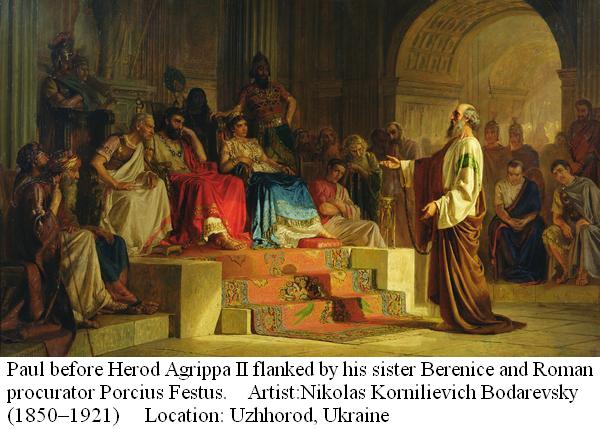 When two years had passed, Felix was succeeded by Porcius Festus. Festus, the new governor, held a party with great pomp at his audience room with the high ranking officers and the leading men of the city including Agrippa II and his sister Bernice in order to give Paul an opportunity to talk to them regarding his faith and allowed for him to appeal to the emperor as he desired. (Acts 25:13-26:32) While Paul was escorted to Rome, Luke and other Hellenist believers accompanied with him and sailed for Italy. Therefore he seems to have treated not as a prisoner. The Roman commander Claudius Lysias, Roman Governors Felix and Festus and Agrippa II, all these men showed a special consideration to Paul and treated him somewhat as a VIP. Paul revealed the plan to go to Rome and go further to Spain after visiting Jerusalem in 'Epistle to the Romans', which he wrote in the city of Corinth in southern Greece during his second evangelistic journey. More over, when he had decided to go back to Jerusalem after completing missionary work in Asia province during his third evangelistic journey, he said again in Ephesus, "After I have been there, I must visit Rome also." (Acts 19:21) He appears to have focused on evangelism in Rome as early as these times. Therefore he seems to have achieved successfully his original purpose on the pretext to appeal to the emperor. Was it also part of his plan to be beheaded in Rome? ○Conversion and Resurrection 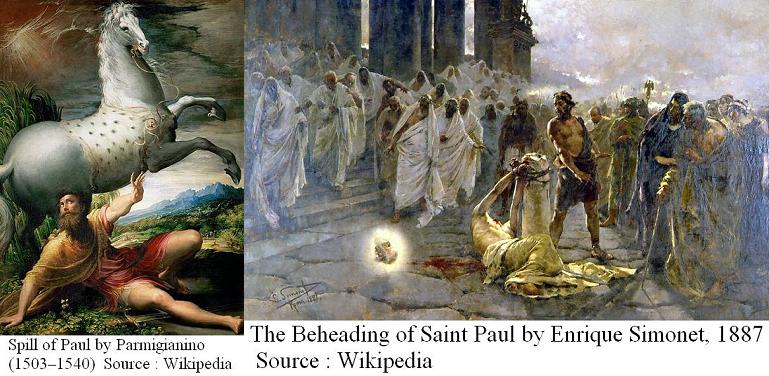 When he told the crowd in front of the barracks (Acts 21:40-22:21), when he told the members of the Sanhedrin (Acts 23:1-10), when he made a clarification on the trial before Felix (Acts 24:1-21), when he stood trial before Festus (Acts 25:6-12) and when he told the high ranking officers and the leading men of the city of Caesarea including Agrippa II at the governor's audience room (Acts 25:23-26:32), he explained repeatedly about circumstances that he had gotten a conviction about the conversion and the Resurrection which form a core of Paul's theology. It was a testimony regarding his true experience of the baptism with the Holy Spirit. If his true experience of the baptism with the Holy Spirit is classified based on the theory of "Wu Wei Pian Zheng (五位偏正)," or "Five Relations between Particularity and Universality" developed by the Zen master Dong-shan Liao-jie (洞山了价:807-869), it is the relation of the fifth, that is, 'Jian zhong dao (兼中到)' or enlightenment achieved between universality (manifestation of Jesus) and particularity (the martyrdom of Stephen and the persecution against Hellenist believers). Cao-shan Ben-ji (804-901), the disciple of Dong-shan, interpreted "Jian zhong dao" and said. "It is neither words nor no-words. Primarily it is free from both, yet it directly hits the point." Dong-shan preached, "One should reveal Zen through his action or experience it through self-realization and understand ultimate reality."  Once a monk asked Master Dong-shan: "When a snake swallows a frog, should you save its life, or should you not?" The Master answered: "If you save it, it means that 'both of your eyes are blind.' If you do not save it, it means that 'both your body and shadow are not visible." (Record of the Dialogues of Dongshan) Mr. Chung-yuan Chang (1907-1988), Professor of Philosophy at the University of Hawaii at Manoa, commented, "It is through this unusual profundity of expression that Dong-shan's inner experience is revealed. He was free from both saving the life of the frog and not saving it. His answer followed the approach of 'Jian zhong dao'." <To be continued> 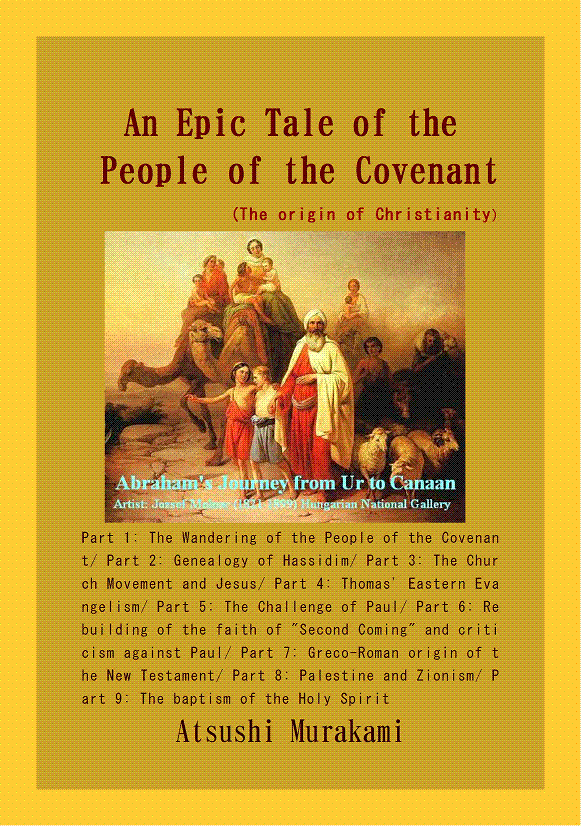 ○What is "Baptism with The Holy Spirit"? According to the dialectic of the Gospel of John, 【Thesis】"A man can possess eternal life through accepting testimony of the Son of man and being baptized by him." (John 5:24) 【Anti-thesis】But "The one who comes from the earth cannot accept the testimony by one from heaven."(John 3:32) How then can a man possess eternal life? 【Synthesis】"If you want to be baptized with the Holy Spirit, you can just go back to the word which was with God in the beginning (John 1:1) and certify that God is truthful. (John 3:33)" When he said, "You are Huichao," Zen Master Fayan thrusted vivid Self in Huichao in front of his eyes. Purchase here Your Comments / UnsubscribeSEAnewsFacebookSEAnewsGoogleSEAnews eBookstoreSEAnews eBookstore(GoogleJ) |
|
[Your Comments / Unsubscribe]/[您的意见/退订]/[ご意見/配信停止]
Please do not directly reply to the e-mail address which is used for delivering the newsletter. 请别用递送新闻的邮件地址而直接回信。 メールをお届けした送信専用アドレスには返信しないで下さい。 |